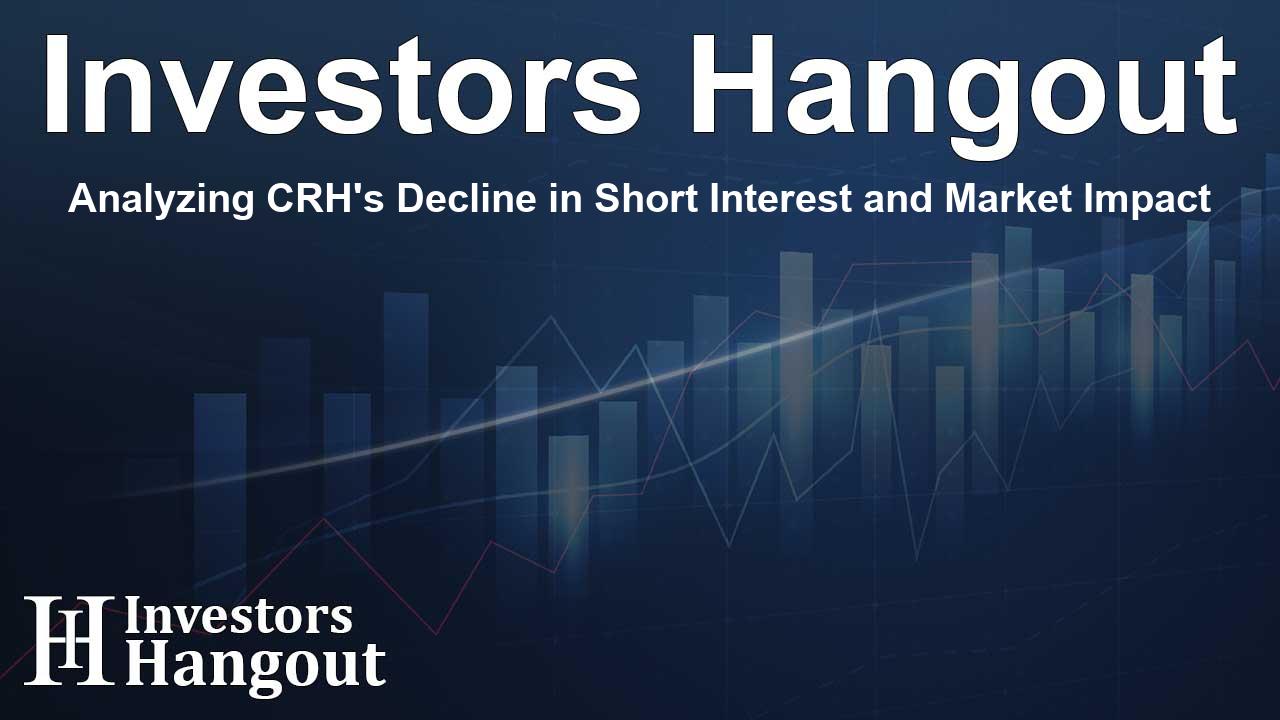Analyzing CRH's Decline in Short Interest and Market Impact

Understanding the Current Short Interest of CRH
CRH's recent update indicates a notable change in its short interest, revealing that the percentage of shares sold short has decreased. As of the latest reports, CRH, which is traded on the NYSE under the ticker symbol CRH, has seen its short interest drop by 10.67%. This decline translates to approximately 10.67 million shares currently sold short, equating to about 1.59% of all available shares for trading. This reduction in short interest may be indicative of a shifting sentiment among investors.
The Implications of Decreased Short Interest
Understanding short interest is crucial for investors and traders alike. Short interest refers to the number of shares sold short but not yet covered or closed out. Essentially, it provides insights into market sentiment—an increase suggests a bearish outlook, while a decrease can indicate a more bullish perspective. With CRH’s short positions covering in approximately 2.1 days based on its trading volume, the market may view the reduced short interest as a positive signal.
Why Short Interest Metrics Are Significant
The significance of short interest metrics lies in their ability to reflect investor confidence. A high short interest may suggest that investors expect the stock price to fall, while a lower short interest like that of CRH might imply a more optimistic view towards the company’s future. Investors should closely monitor these trends as they can potentially influence trading strategies and market movements.
Visualizing CRH's Short Interest Trends
Analyzing the trends related to CRH's short interest can be revealing. While recent data shows a downward trend, this does not guarantee immediate price increases for the stock. It’s crucial for traders to understand that the number of shares being shorted is lessened but they should consider other market dynamics as part of their trading strategies.
Insights from Peer Comparisons
When assessing CRH’s short interest, it is beneficial to compare it with its peers. Analysts often leverage peer comparison techniques to gauge company performance relative to industry standards. In CRH's case, its peer group average for short interest stands at 5.01%, indicating that CRH has a lower short interest compared to most competitors, reinforcing a more favorable outlook.
What Increasing Short Interest Might Indicate
Interestingly, increasing short interest can sometimes have bullish implications for a stock. This might seem counterintuitive, but in some cases, if a stock has high short interest, it can lead to a short squeeze, potentially driving up the stock price as short sellers cover their positions. This scenario can present unique trading opportunities for investors.
Final Thoughts on CRH's Position
In conclusion, as CRH experiences shifts in its short interest, it is essential for investors to remain informed about broader market trends and competitor comparisons. The valuation metrics, such as short interest percentages, can serve as valuable indicators when making investment decisions. Thus, understanding not just the numbers but the market sentiment behind them is key for any investor involved with CRH.
Frequently Asked Questions
What does a decrease in short interest indicate?
A decrease in short interest typically suggests that investors might be becoming optimistic about the stock's future, potentially expecting price increases.
How does short interest relate to market sentiment?
Short interest serves as a barometer for market sentiment; high short interest may indicate pessimism, while low short interest reflects growing confidence among investors.
What factors should be considered alongside short interest?
Traders should consider trading volumes, company fundamentals, and overall market conditions when analyzing short interest.
Can increasing short interest be positive?
Yes, increasing short interest can lead to a short squeeze, which may drive stock prices higher if short sellers are forced to buy back shares.
How does CRH compare to its industry peers?
CRH's short interest is lower than the industry peer average, indicating a more favorable position compared to many competitors.
About The Author
Contact Addison Perry privately here. Or send an email with ATTN: Addison Perry as the subject to contact@investorshangout.com.
About Investors Hangout
Investors Hangout is a leading online stock forum for financial discussion and learning, offering a wide range of free tools and resources. It draws in traders of all levels, who exchange market knowledge, investigate trading tactics, and keep an eye on industry developments in real time. Featuring financial articles, stock message boards, quotes, charts, company profiles, and live news updates. Through cooperative learning and a wealth of informational resources, it helps users from novices creating their first portfolios to experts honing their techniques. Join Investors Hangout today: https://investorshangout.com/
The content of this article is based on factual, publicly available information and does not represent legal, financial, or investment advice. Investors Hangout does not offer financial advice, and the author is not a licensed financial advisor. Consult a qualified advisor before making any financial or investment decisions based on this article. This article should not be considered advice to purchase, sell, or hold any securities or other investments. If any of the material provided here is inaccurate, please contact us for corrections.
